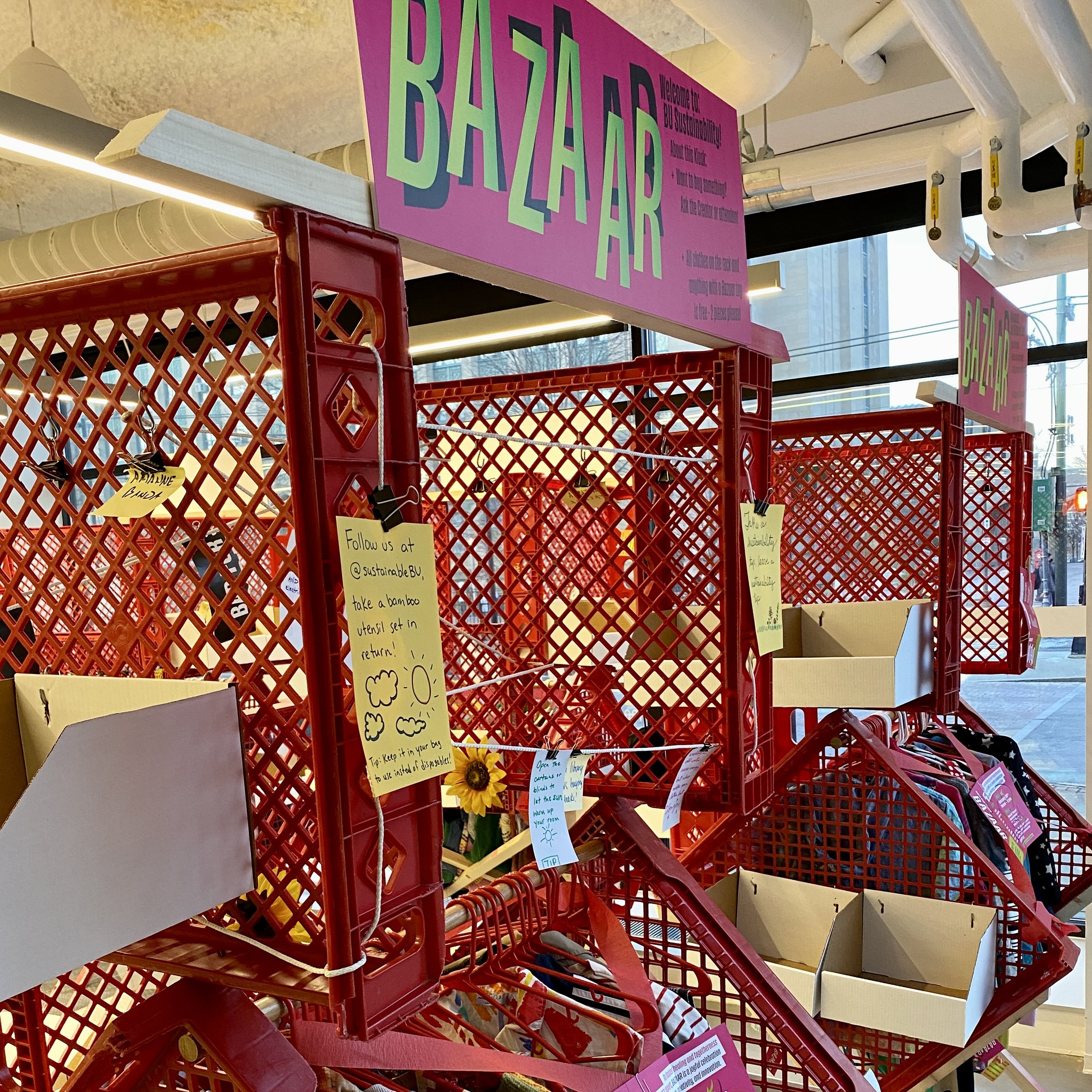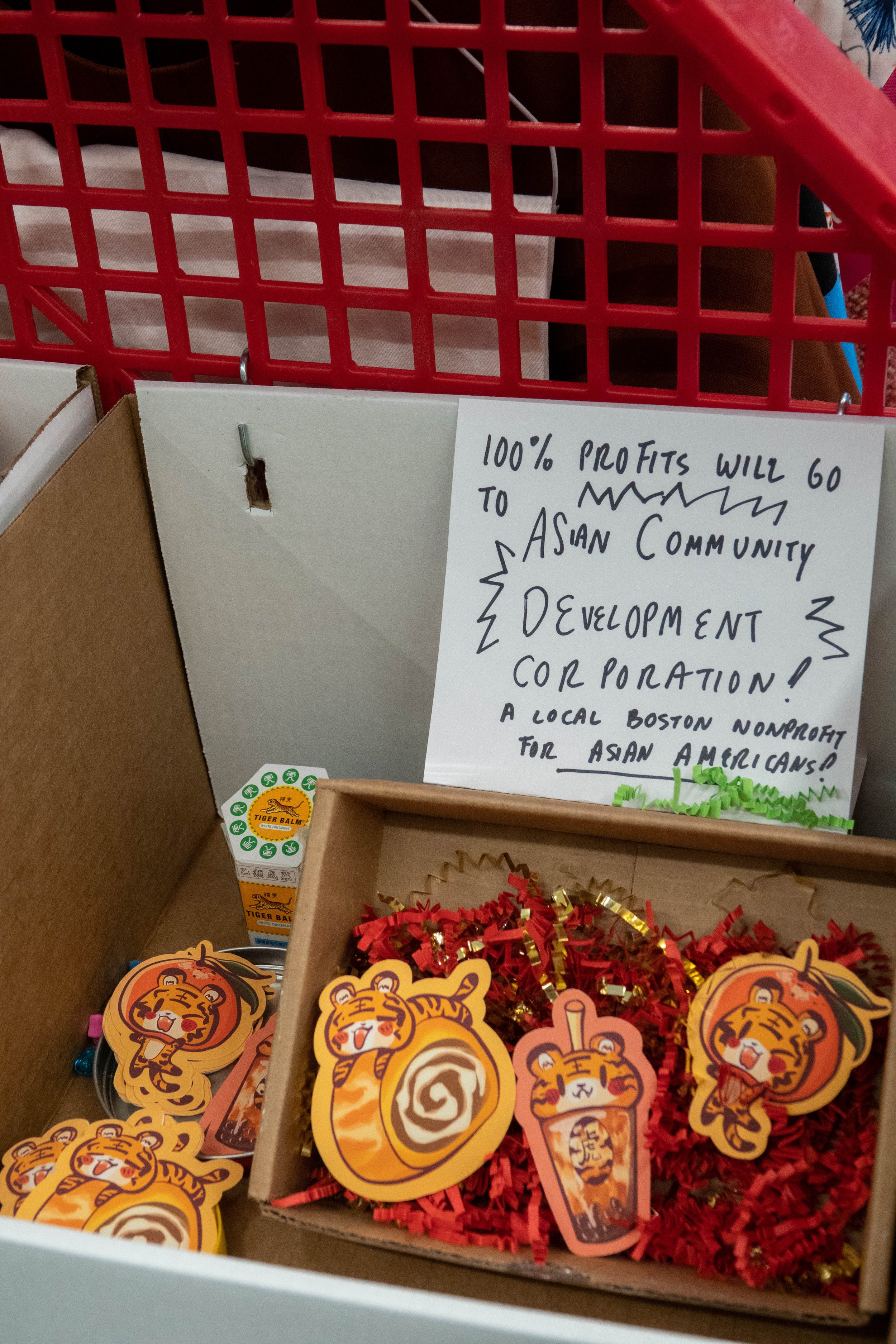
BU Bazaar
The Maker Space Program spearheaded a student-led initiative aimed at raising awareness and increasing participation in ten Boston University innovation centers.
The event proved to be a resounding success, with 1,200 students being introduced to and remaining engaged with these centers of innovation.








01.
Proposal
The Maker Space Program will direct the design discovery and programmatic development for a single, cross-center, large-scale, student-driven “event” to reduce social stress and grow and retain students’ participation and awareness in the innovate@BU Centers.
02.
Rationale and Motivation
The Boston University student community exhibits social anxieties that negatively impact a healthy, creative, innovative culture. To reduce the stresses caused by nearly two years of social isolation, BU students must reconnect with extracurricular campus life to (re)build relationships with one another.
Because young adults’ creativity and socialization diminish when stressed (COVID-19), they lose a critical mode to process what they need to feel safe, express their anxieties, and communicate their needs.
Therefore, the time is now for an agile strategy and unique initiatives that alleviate student stress through creative experiences and social interactions within the BU Centers, Institutes, and Makerspaces.
03.
Scope of work
Week 1: 11/15-11/19: CRAFT CONCEPT/MEET WITH CENTER DIRECTORS
Week 2: 11/22-11/26 (THXG) BUILD STUDENT SCOUT GROUP / REFINE CONCEPT
Week 3: 11/29-12/3 MARKETING: POSTERS / INSTAGRAM
Week 4: 12/6-12/10 REQUEST COLLECT/CLOTHING
Week 5: 12/13-12/17 KIOSK DESIGN/DEVELOPMENT
Week 6: 12/20-12/24 FLYER/MAP DESIGN AND BUILD KIOSKS
Week 7: 12/27-12/31 HOLIDAY BREAK
Week 8: 1/3-1/7 SCOUT ORGANIZATION
Week 9: 1/10-1/14 PRINT/DIGITAL MEDIA BLITZ + KIOSK FUNCTIONALITY/ACCESSORIES
Week 10: 1/17-1/21 MLK CLASSES BEGIN 1/20 UPDATE CENTERS AND KIOSK CURATION
Week 11: 1/21-1/28 FINAL DETAILS, PROJECT LAUNCH + REPORT
04.
Attendance Data
Student Participants: 33 student “Bazaarers” showcased their creative projects on the nine Bazaar Kiosks
Student attendees and unique visits
The data on attendance for each of the innovate@BU centers were collected independently by each center using various methods. These numbers reflect a low-high approximation of individual student visits to the innovate@BU center kiosks during Bazaar:
BU Arts Initiative: 50-100 attendees (observational evidence staff / Bazaarers)
EPIC: 100-150 attendees (Based on the number of key chains given away)
BUild Lab: 305 attendees
Note: Tap data is available mid-Feb, and Still figuring out how to get my email addresses from the system)
Law Clinic: Unknown attendees (unstaffed by Law Clinic)
Activist Lab: Unknown attendees (unstaffed by Activist Lab)
Sustainability: 150 attendees (staff spoke directly to 50+ people)
Spark!: 150-200 attendees
400 unique API calls for our custom-designed Bazaar facial recognition software; approximately 150-200 people used the software.
56 Students filled out an optional sign-in sheet
82% of visitors were first, second, and third-year students. Majors included: CS, Biochem, Graphic Design, Psych, PR, Education, Journalism, Business, PT, International Relations, Chemistry, Econ, Mechanical Engineering, Anthropology, Archaeology, Deaf studies, Environmental, and others.
SILab: 100-150 attendees
BTEC: 100-150 attendees
Total aggregate unique innovate@BU center visits: 955 - 1205
Outreach: 200 Posters and 16,000 Flyers
05.
POST-EVENT Recommendations
The Maker Space Program developed these recommendations based on conversations with students and staff and first-hand observations of the operations, missions, student engagement, and culture in the nine participating innovate@BU centers.
Build off Bazaar
When designing programming to familiarize students outside of innovate@BU center disciplines, particular care must be made to slowly and carefully climatize students to innovate@BU center missions and jargon. CFA students, in particular, may have aversions to entrepreneurial mindsets that will require customized approaches to educate slowly by using a “look and feel” to which they are accustomed.
Embed the excitement and awareness of the innovate@BU centers by connecting the enthusiasm for Bazaar in innovate@BU center’s near future programming. Specifically, welcome back the broad spectrum of students who attended Bazaar to build a richer diversity of people and backgrounds in your innovate@BU center. This diversity of viewpoints will enable your mission to engage your core student stakeholders deeply and meaningfully.
Give Bazaar to diverse students from across the innovate@BU centers to run in the future. Trust that they will know the most appropriate way to run Bazaar for their peers and make Bazaar a successful, repeatable event and a hip megaphone for innovate@BU.
The innovate@BU center teams must authentically learn how to celebrate all the diversity of creativity by examining the Bazaar experience.
Embed this learning into their innovate@BU missions by intentionally welcoming all forms of creativity and all students to whatever degree encourages diversity while limiting mission creep.
Use Bazaar to demonstrate to non-business majors how the mechanics and experience of Bazaar is an entrepreneurial mindset that worked to their advantage and is critical to their success.
Develop tiered programming that gently teaches student creatives and non-business majors to be more successful (however they define success) at Bazaar.
Invite veteran Bazaarers* to critique the projects of all students working in innovate@BU centers.
Invite veteran Bazaarers to assist folks preparing for the next Bazaar.
Champion Bazaar to business students (who largely did not participate and perceived Bazaar as frivolous) as a real-world experience and opportunity to receive feedback on their ventures.
Develop robust mind/body safety for students
When students are mind/body-safe, the diversity of student backgrounds and disciplines in innovate@BU centers will increase, leading to broader viewpoints, novel ideas, and discoveries that ultimately increase the innovate@BU center’s asset value.
Design an Honor Code with a diversity of students and integrate its tenets into everything the innovate@BU centers do. An honor code is separate from a mission statement because it is a set of rules or ethical principles based on ideals defining exemplary behavior. Then post the Honor Code prominently.
There is an urgent need to develop and integrate mind/body safety protocols for students into the operations and initiatives of the innovate@BU centers. Focus on EPIC Safety:
Emotional: The state of mind as it relates to one's surroundings
Physical: Relating to the material body
Intellectual: The ability to understand ideas
Cognitive: The ability to acquire knowledge
Innovate@BU staff and student teams should receive de-escalation, DEIG, and LGBTQ+ training.
Develop a severity scale for Emotional/Intellectual/Cognitive harm. The scale should reflect the most common types of EIC harm you expect to or do see in your innovate@BU center.
Produce welcoming, fun programming designed to appeal to all BU students by highlighting and incorporating EPIC safety.
Broaden outreach to students with non-traditional business approaches:
Learn methods for designing new copy and programming that appeal to the young adult, not the student. Think: How do I connect my innovate@BU center mission to what young adults love to do in their free time versus appealing to what they accomplish as academics?
Develop university-wide student outreach (survey) initiative to broaden the definition of “entrepreneur.”
Rebrand innovate@BU to highlight an acceptance of all forms of creativity as forms of innovation.
Design new non-competitive or lecture-style programming and pedagogy to enlighten and empower creatives and non-business majors who may not realize that they naturally employ entrepreneurial thinking.
Create pedagogy using the Bazaar marketplace as a case study to teach and test new products, business models, and business philosophies.
Strengthen relationships across the innovate@BU centers.
Develop a cross-center Scout* team to work across the innovate@BU centers blending the missions and pedagogy to develop novel transdisciplinary initiatives and programming.
Encourage cross-center mind-shares between staff member positions (e.g., outreach/comms, operations, external relations, etc.) to increase the ability of innovate@BU to think creatively outside the current operational mandates. (Collect org charts to determine overlap)
Launch a shared calendar for the innovate@BU centers and look for programmatic overlap to produce novel transdisciplinary events, talks, and symposiums and save money.
Pilot a shared data collection tool across innovate@BU centers to track event attendance and student surveys. Share statistics with innovate@BU partners when designing center programming and development.
Student intellectual ownership of the innovate@BU centers
A more profound student dedication and passion for innovate@BU centers are needed. The innovate@BU center student community would become more closely connected to the innovate@BU center if a strong and authentic feeling of personal intellectual ownership of innovate@BU centers was promoted.
Determine which areas of your innovate@BU center would benefit most from student intellectual ownership: E.g., infrastructure, outreach, marketing, and event planning.
Give the innovate@BU center student workforce projects that produce physical artifacts. When students (anyone) walk into a space and sees their work around them, they have an authentic connection to a space that creates intellectual ownership.
Encourage the creation of events that empower students who work in your innovate@BU center to design elements such as branding, signage, and ornamentation that become the look and feel of your innovate@BU center culture.
Definitions:
Bazaarers: A student who is or has participated in Bazaar
Scout: A Student volunteer who worked or works with students from other Centers together on a team build Bazaar
06.
TMSP two-year ASSESSMENT
The Boston University Innovation Centers report, two years later, that Bazaar proved to be a successful initiative that provided the foothold needed to rebuild an engaged and motivated student community.
Despite considerable student interest in making the event annual, the university chose not to allocate the necessary resources and personnel to sustain it as a valuable marketing and recruitment tool.
Regrettably, this missed opportunity to empower student culture with deeper ownership in their community caused a loss in potential attendance and an increasing positive relationship between students and the innovation centers.


